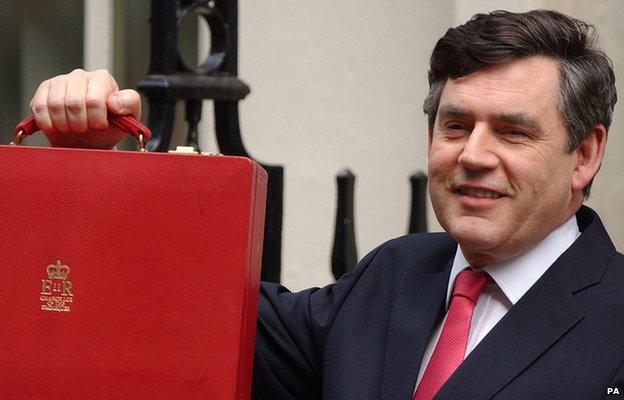Scottish independence: Influence of the undecided voter
- Published

Gordon Brown's speech is calculated to have added salience for those Labour inclined voters:
Questions, questions. Who will decide the Scottish referendum? The people of Scotland.
Within that, whose vote is currently most influential? By definition, those who are undecided, those who are open to persuasion, those who might switch.
Where are the undecided to be found, mostly? Among Labour inclined voters. What might sway them, what are they most concerned about? The household economy, welfare, pensions, childcare.
In which respect, of course, they are not much different from the population as a whole - although, again by definition, those concerns will vary according to financial standpoint.
If your family is struggling, your focus may be more upon welfare benefits. If your family is thriving, your concern may be about preserving what you have. Either way, it is the economy, sensible.
So Gordon Brown's speech in Glasgow tonight is, in one sense, broadly based in that he will talk primarily about the household economy. He is speaking under the banner of Better Together, his first such contribution.
Equally, though, it is calculated to have added salience for those Labour inclined voters: because it is delivered by a former Labour leader and because the core theme is welfare, pensions and public sector employment.
I say "Labour inclined" for a reason.
Simple arithmetic tells us that many of these voters will have opted for the SNP at the 2011 Holyrood election and perhaps also in 2007. Their historical inclination, their political family, remains Labour: or, at least, avowedly not Conservative.

Higher pension costs are an issue for the UK as a whole.
Such loyalty, however, is not slavish: it can be swayed.
Tonight Gordon Brown is out to sway them while, as noted earlier, also offering a broader analysis. His argument is that the wider tax base of the UK is better placed to afford the rising cost of Scottish pensions, claimed by the rising number of Scottish pensioners.
Higher pension costs, of course, are an issue for the UK as a whole.
Mr Brown will argue that Scotland faces a distinctive challenge because more of our pensioners are reliant on pension credits and disability benefits.
Further, Mr Brown will argue that public sector pensions would mean a substantial bill for an independent Scotland to pay.
He estimates that at £100bn, based on hitherto unpublished analysis from the Department for Work and Pensions - while acknowledging that it is difficult to be precise as such calculations would form part of post referendum negotiations in the event of a "Yes" vote.
Thirdly, he will argue that there would be additional costs caused by the establishment of a separate Scottish pensions and benefits system.
In essence, Mr Brown is arguing Scotland could not afford its current level of pension and welfare provision - or, more precisely, the forward projected level.

Mr Brown's opponents say there are questions over his record on pensions as chancellor
Responding to this, the supporters of independence offer a rival analysis, together with a dose of ad hominem political attack. They play the ball and the man.
They note that spending on social protection in Scotland has been lower than for the UK as a whole as a percentage of GDP over the last five years.
They note further that the dependency ratio - that is, pensioners and children compared with the working population - is projected to be lower in Scotland than in the UK over the next 15 years.
Thereafter, as the balance worsens to Scotland's disfavour, they argue that enhanced economic growth, deploying the powers of independence, could grow the numbers of those in work.
In essence, they are arguing that pensions will be a big challenge for both Scotland and the remainder of the UK, rUK.
Argument 'nonsense'
But that Scotland, including oil, has the intrinsic wealth to cope.
And playing the man? They say Gordon Brown as chancellor faced questions over his record on pensions, notably through failing to restore the earnings link.
Further, they say the participants in Better Together, principally Labour and the Conservatives, have attacked each other repeatedly over their policies on pensions and welfare.
This, say supporters of independence, undermines any sense of a single, coherent approach on such matters by advocates of Union.
Finally, supporters of independence say that it is "nonsense" to project the UK as an efficient distributor of risk and resources, given that the UK is, they argue, one of the most unequal societies in the developed world.
The broader choice facing voters on this issue - and indeed in the referendum as a whole - rests upon credibility.
Do you believe that an independent Scotland could grow and sustain the economy in order to fund pensions and welfare?
Or do you believe that such an endeavour is more likely within the UK?
Questions, questions.